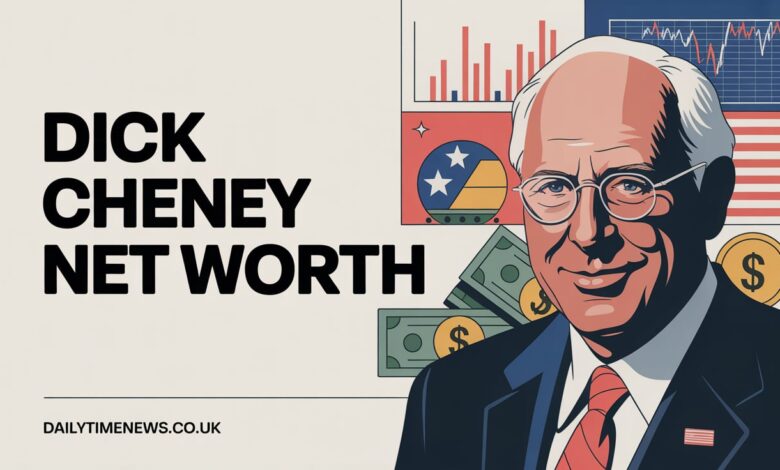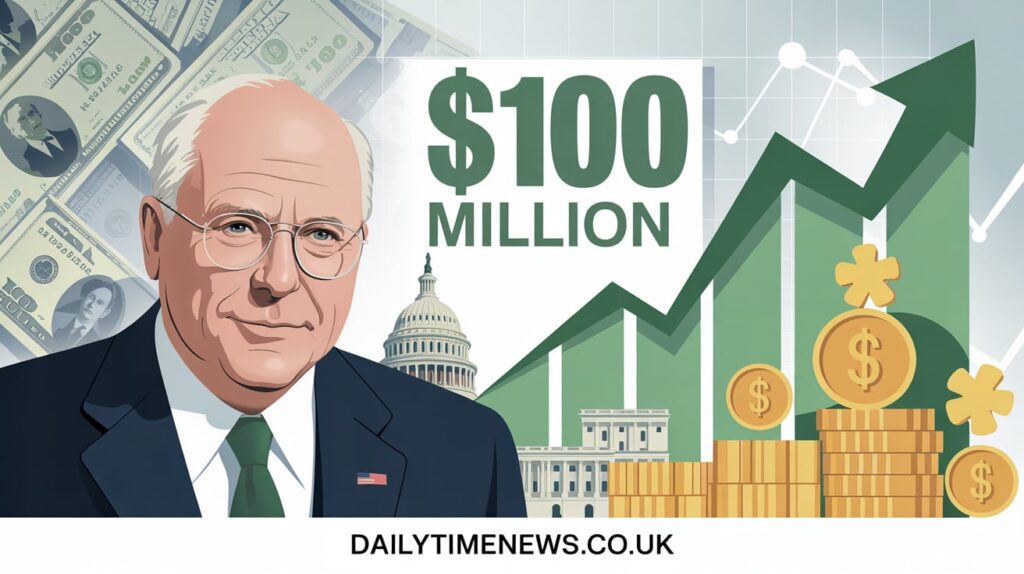Shocking Dick Cheney Net Worth: Fortune Revealed

Introduction
When you think about powerful political figures who’ve accumulated serious wealth, Dick Cheney’s name likely comes to mind. The former Vice President under George W. Bush has built an impressive financial empire that extends far beyond his government salary. But just how much is Dick Cheney net worth today? The answer might surprise you, especially when you consider the various income streams he’s developed over his decades in public service and the private sector.
Understanding Dick Cheney net worth gives you insight into how political careers can translate into substantial financial success. His journey from a congressman to Vice President, combined with his corporate leadership roles, created a blueprint for wealth accumulation that remains controversial yet fascinating. Let me walk you through the numbers, the sources, and the controversies that define his financial legacy.
The Current Dick Cheney Net Worth Estimate
Dick Cheney net worth is estimated to be between $90 million and $150 million as of recent calculations. That’s a staggering amount for someone who spent much of his career in public service. You might wonder how a government official amassed such wealth. The answer lies in his strategic positioning between politics and corporate America.
Most financial analysts place his net worth closer to $100 million. This figure includes real estate holdings, investment portfolios, book royalties, and his lucrative tenure at Halliburton. Unlike many politicians who struggle financially after leaving office, Cheney entered the corporate world at the highest levels, which dramatically accelerated his wealth building.
His financial disclosures over the years paint a picture of steady growth. When he became Vice President in 2001, his net worth was already estimated at around $30 million to $60 million. The gap between then and now shows how post-political opportunities can be even more profitable than the positions themselves.
Early Career and Initial Wealth Building
Before Dick Cheney net worth reached eye-popping figures, he started with humble beginnings in Wyoming. His early political career in the 1970s and 1980s provided a solid foundation but not extraordinary wealth. As White House Chief of Staff under Gerald Ford and later as a congressman, he earned respectable government salaries.
During his time in Congress representing Wyoming from 1979 to 1989, Cheney built important connections. These relationships would later prove invaluable for his financial growth. Congressional salaries during this period ranged from $60,000 to $90,000 annually, which was comfortable but certainly not millions.
His appointment as Secretary of Defense under George H.W. Bush from 1989 to 1993 marked an important transition. Cabinet-level positions came with slightly higher compensation and, more importantly, increased visibility in corporate circles. This visibility set the stage for his most financially transformative move.
The Halliburton Years: A Financial Game Changer
The most significant contributor to Dick Cheney net worth came from his time at Halliburton. In 1995, he became CEO of the oil services giant, a position he held until 2000. This five-year period fundamentally transformed his financial situation.
As Halliburton’s CEO, Cheney earned an impressive salary plus stock options. Reports indicate he made approximately $20 million during his tenure there. His compensation package included base salary, bonuses, and substantial stock options that would continue appreciating even after he left.
When he departed to become Vice President, Cheney sold his Halliburton stock options, netting around $30 million to $40 million. He also retained deferred compensation that continued paying out during his vice presidency. This arrangement sparked controversy, as critics questioned whether his government decisions might favor his former employer.
The Halliburton connection remained controversial throughout his vice presidency. The company received billions in government contracts during the Iraq War, leading to allegations of conflicts of interest. Cheney maintained he’d severed all financial ties, but the deferred compensation told a different story.
Vice Presidential Compensation and Perks
While serving as Vice President from 2001 to 2009, Dick Cheney net worth continued growing, though not primarily from his government salary. The Vice President’s annual salary during his tenure was approximately $200,000, which increased to $230,000 by the end of his term.
However, the real financial benefits came from continued Halliburton payouts and investment growth. His financial disclosures showed he received between $150,000 and $211,000 annually in deferred compensation from Halliburton. These payments were structured to avoid direct conflicts of interest, though critics remained skeptical.
The vice presidency also came with valuable perks that reduced living expenses. Free housing, transportation, security, and travel meant his salary went further. These benefits, while not adding directly to net worth, allowed more of his income to be invested rather than spent on daily living.
His investment portfolio during this period was substantial. Financial disclosures revealed holdings in various mutual funds, bonds, and other financial instruments worth millions. Conservative investment strategies helped preserve and grow this wealth even during economic downturns.

Real Estate Holdings
Real estate represents a significant portion of Dick Cheney net worth. His property portfolio includes several impressive holdings that have appreciated considerably over time. These investments demonstrate his savvy approach to wealth preservation through tangible assets.
His primary residence has been in McLean, Virginia, an affluent suburb of Washington, D.C. This property, purchased in the 1990s, is now worth several million dollars. The home sits in one of the most expensive real estate markets in the country, where property values have climbed steadily.
The Cheneys also own a home in Wyoming, maintaining their connection to the state he represented in Congress. Wyoming properties generally cost less than D.C. area homes, but this property still represents significant value. It serves as both a personal retreat and a political statement about his roots.
Additional real estate investments likely exist but aren’t always publicly disclosed. Many wealthy individuals diversify into commercial real estate or investment properties. Given Cheney’s financial sophistication, similar holdings would make strategic sense.
Book Deals and Speaking Engagements
Post-vice presidency income streams have added substantially to Dick Cheney net worth. His memoir, “In My Time: A Personal and Political Memoir,” published in 2011, became a bestseller. Book advances and royalties for high-profile political memoirs can reach several million dollars.
Speaking engagements provide another lucrative income source. Former Vice Presidents command fees between $75,000 and $200,000 per speech. While Cheney hasn’t pursued the speaking circuit as aggressively as some former officials, selective appearances still generate substantial income.
His daughter Liz Cheney’s political career has kept the family name in public discourse. This continued relevance maintains demand for his perspectives and insights. Media appearances, consulting opportunities, and advisory roles all contribute to ongoing income.
Corporate board positions offer another revenue stream. Former high-ranking government officials often join corporate boards, earning $200,000 to $500,000 annually per board. These positions leverage political connections and policy expertise that companies value highly.
Investment Strategy and Portfolio
The investment approach underlying Dick Cheney net worth appears conservative yet strategic. Financial disclosures over the years reveal a diversified portfolio heavy on bonds, mutual funds, and blue-chip stocks. This strategy prioritizes wealth preservation over aggressive growth.
His holdings have included significant positions in Vanguard funds and other index investments. This passive investment strategy minimizes fees while providing steady, market-matching returns. It reflects a sophisticated understanding of long-term wealth building.
Energy sector investments have naturally featured prominently, given his background. However, his portfolio extends well beyond oil and gas. Financial services, healthcare, and technology sectors all appear in his disclosed holdings. This diversification protects against sector-specific downturns.
Tax-advantaged accounts and trusts likely play significant roles in his wealth management. Sophisticated estate planning ensures wealth preservation across generations. These strategies are standard among high-net-worth individuals seeking to minimize tax burdens legally.
Controversies and Criticisms
No discussion of Dick Cheney net worth would be complete without addressing the controversies. Critics have long questioned whether his wealth resulted from inappropriate mixing of public service and private gain. The Halliburton connection remains the most persistent criticism.
During the Iraq War, Halliburton subsidiary KBR received no-bid contracts worth billions. Cheney’s continued deferred compensation during this period raised obvious questions about conflicts of interest. He donated the payments to charity, attempting to deflect criticism, but questions persisted.
His energy task force meetings early in the Bush administration also sparked controversy. Secret meetings with energy executives led critics to allege policy was shaped by industry interests. Whether this impacted Dick Cheney net worth directly is unclear, but it fed perceptions of impropriety.
Transparency advocates argue that financial disclosure rules allowed too much obscurity. Complex deferred compensation arrangements, blind trusts, and investment vehicles can hide the true extent of wealth and its sources. Cheney’s disclosures met legal requirements but left questions unanswered.
Comparison to Other Political Figures
When you compare Dick Cheney net worth to other political figures, he ranks among the wealthier but not the wealthiest. Presidents and Vice Presidents traditionally haven’t been the richest politicians, especially compared to self-funded candidates or those with inherited wealth.
Former President George W. Bush, his running mate, has an estimated net worth of around $40 million. This comes primarily from his oil business ventures and the Texas Rangers ownership. Bush’s wealth is substantial but less than Cheney’s.
Bill and Hillary Clinton have accumulated over $100 million, primarily through speaking fees and book deals post-presidency. Their wealth-building trajectory differs from Cheney’s, focusing more on personal brand monetization than corporate connections.
Joe Biden, by contrast, had one of the lowest net worths among recent Vice Presidents, estimated at under $10 million throughout most of his career. His wealth increased significantly only after his vice presidency through books and speaking. This demonstrates how varied wealth accumulation can be among political figures.
Current Lifestyle and Spending
Despite his wealth, Dick Cheney net worth doesn’t translate into ostentatious public displays. His lifestyle appears relatively modest compared to some wealthy individuals. This restraint may reflect Wyoming values or simply personal preference.
His healthcare costs have been substantial due to his well-documented heart problems. Multiple heart attacks, a heart transplant, and ongoing medical care require significant resources. Fortunately, his wealth easily covers these expenses that might bankrupt average Americans.
Security costs likely consume a portion of his wealth. As a former Vice President who remains controversial, ongoing security measures are both prudent and expensive. These costs, while not publicly disclosed, represent a unique expense for political figures.
Charitable giving appears in his financial history. Donations to various causes, particularly those deferred Halliburton payments mentioned earlier, show some philanthropic inclination. However, he’s not known as a major philanthropist compared to other wealthy figures.
Estate Planning and Legacy
At his age, estate planning significantly impacts how Dick Cheney net worth will be distributed. Sophisticated trusts and legal structures likely ensure his wealth transfers to family members efficiently. These arrangements minimize estate taxes while maintaining family control.
His children, including former Representative Liz Cheney, stand to inherit substantial wealth. Estate planning for high-net-worth individuals often involves generation-skipping trusts and other mechanisms that preserve wealth across multiple generations.
The Cheney name carries both prestige and controversy as a legacy. Financially, his descendants are well-positioned. Politically, the legacy is more complex, with strong supporters and harsh critics. How history ultimately judges him remains to be seen.
His papers, records, and memorabilia may also hold significant value. Presidential and vice-presidential archives can be worth millions, both for historical research and potential commercial opportunities through authorized biographies or documentaries.

How Dick Cheney Net Worth Was Built
Understanding Dick Cheney net worth requires looking at multiple income streams working simultaneously. Government salaries provided stability but not wealth. Corporate leadership delivered substantial immediate compensation. Deferred payments ensured long-term income. Investments grew the base through compound returns.
His timing was remarkably fortunate. Entering Halliburton just as the energy sector was consolidating and expanding globally positioned him perfectly. Leaving before the Iraq War avoided direct conflict-of-interest accusations during the most lucrative contract period.
Strategic decision-making characterized his wealth building. Maintaining corporate connections while serving in government kept doors open. Leveraging his defense secretary experience to lead a defense contractor showed clear vision about how his expertise translated to private sector value.
The wealth multiplier effect of power cannot be ignored. Each position he held opened new doors and opportunities. Defense Secretary led to Halliburton CEO. CEO enabled the financial foundation for accepting the Vice Presidency. Vice Presidency created post-government opportunities worth millions.
The Future of His Wealth
Looking forward, Dick Cheney net worth will likely continue growing modestly through investment returns. At his age, wealth preservation rather than aggressive growth makes sense. Conservative investment strategies should maintain purchasing power while providing income.
Medical expenses could increase as health challenges continue. However, given his wealth level, even catastrophic health costs wouldn’t meaningfully impact his net worth. Quality healthcare remains accessible regardless of expense.
Potential book projects or authorized biographies could add to his estate’s value. Historical interest in his vice presidency ensures continued demand for insider perspectives. Documentary projects or streaming series about his era could generate licensing fees.
The political climate affects his earning potential from speaking and consulting. As political divisions intensify, controversial figures like Cheney face both increased criticism and devoted support. This polarization can actually enhance value in certain markets willing to pay premium rates for his perspective.
Lessons from His Financial Journey
What can you learn from how Dick Cheney net worth was built? First, positioning matters enormously. His career arc strategically alternated between government service and private sector leadership, maximizing both experiences.
Second, expertise in valuable sectors pays premium rates. His defense and energy expertise positioned him in industries with massive government contracts and global demand. Developing specialized knowledge in high-value fields creates opportunities.
Third, network effects compound over time. Each position expanded his connections, which led to subsequent opportunities. Building and maintaining professional relationships throughout your career creates compounding returns beyond just salary.
Fourth, diversification protects wealth. His investment strategy spread risk across multiple asset classes and sectors. This boring approach doesn’t make headlines but preserves wealth effectively through market cycles.
Finally, timing and luck play roles that can’t be ignored. The geopolitical events during his career, particularly 9/11 and its aftermath, created circumstances that enhanced his political importance and indirectly his wealth-building opportunities.
Conclusion
Dick Cheney net worth stands as a testament to how political power and corporate success can intertwine to create substantial wealth. His estimated $100 million fortune resulted from strategic career moves, lucrative corporate leadership, and savvy investments. Whether you view his wealth accumulation as earned reward for expertise or questionable mixing of public and private interests likely depends on your political perspective.
What’s undeniable is that Cheney mastered the art of transitioning between government service and private sector leadership. His financial success provides a roadmap that many politicians have since followed, alternating between positions of power and lucrative corporate roles. Understanding his wealth-building strategies offers insights into how modern political figures approach financial security.
What do you think about the wealth accumulated by political figures? Should there be stricter regulations on post-government employment, or does expertise deserve market-rate compensation regardless of previous public service? The debate continues as more political figures follow similar paths to wealth.

Frequently Asked Questions
What is Dick Cheney net worth in 2024?
Dick Cheney net worth is estimated between $90 million and $150 million, with most analysts placing it around $100 million. This wealth comes from his Halliburton tenure, investments, real estate, book deals, and deferred compensation arrangements. His financial disclosures over the years show steady wealth growth from multiple income streams.
How did Dick Cheney make his money?
Cheney built his wealth primarily through his role as CEO of Halliburton from 1995 to 2000, earning approximately $20 million during that period. He also received substantial deferred compensation during his vice presidency. Additionally, strategic investments, real estate holdings, book royalties, and post-government speaking engagements contributed to his fortune.
How much did Dick Cheney make from Halliburton?
Cheney made approximately $20 million in total compensation during his five-year tenure as Halliburton CEO. When he left to become Vice President, he sold stock options worth $30 million to $40 million. He also received deferred compensation of $150,000 to $211,000 annually during his vice presidency, which he donated to charity.
Is Dick Cheney richer than George W. Bush?
Yes, Dick Cheney net worth exceeds George W. Bush’s estimated net worth. Cheney is worth approximately $100 million, while Bush’s net worth is estimated around $40 million. Bush’s wealth comes mainly from oil ventures and his stake in the Texas Rangers baseball team, while Cheney’s primary wealth source was Halliburton.
What is Dick Cheney’s annual income now?
Cheney’s current annual income isn’t publicly disclosed but likely comes from investment returns, potential book royalties, occasional speaking engagements, and his government pension. His Vice Presidential pension is approximately $85,000 annually. Investment income from a $100 million portfolio could generate $3 million to $5 million annually depending on allocation and market performance.
Did Dick Cheney profit from the Iraq War?
This remains controversial. While Cheney received deferred compensation from Halliburton during the war when the company received billions in government contracts, he donated these payments to charity. Critics argue his policies benefited his former employer, while supporters note he severed direct financial ties before becoming Vice President. The perception of conflict of interest persists regardless.
How much is Dick Cheney’s house worth?
Cheney’s primary residence in McLean, Virginia, is worth several million dollars, likely between $3 million and $6 million based on comparable properties in this affluent Washington, D.C. suburb. He also owns property in Wyoming. Exact current values aren’t publicly disclosed, but these properties represent a significant portion of his real estate portfolio.
Does Dick Cheney still receive Halliburton money?
No, Cheney no longer receives deferred compensation from Halliburton. Those payments ended after his vice presidency concluded. He has no current financial relationship with the company. All stock options were sold when he became Vice President, and the deferred compensation arrangement that continued during his vice presidency has since been fully paid out.
What does Dick Cheney do now?
Cheney maintains a relatively low public profile compared to some former officials. He occasionally provides political commentary, particularly on national security issues. He’s not actively pursuing speaking tours or consulting work at his age. Much of his time focuses on personal interests, family, and managing his health following his heart transplant.
How does Dick Cheney’s wealth compare to other Vice Presidents?
Dick Cheney net worth ranks among the higher net worths of modern Vice Presidents. Joe Biden had less than $10 million for most of his career. Al Gore’s net worth is estimated around $300 million, though much came from his Apple board position and climate advocacy investments after his vice presidency. Mike Pence’s net worth is estimated at around $1 million. Cheney’s wealth falls in the upper range among recent Vice Presidents.
Also Read dailytimenews.co.uk




